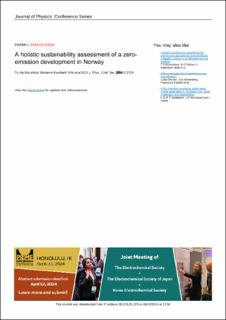A holistic sustainability assessment of a zero-emission development in Norway
Peer reviewed, Journal article
Published version
Permanent lenke
https://hdl.handle.net/11250/3116347Utgivelsesdato
2023Metadata
Vis full innførselSamlinger
Originalversjon
10.1088/1742-6596/2654/1/012129Sammendrag
The decarbonisation of the construction sector is critical to meet national and international climate goals. Literature gives many examples of measures for the reduction of greenhouse gas (GHG) emissions from buildings. However, few studies investigate the tradeoffs between potentially conflicting GHG emission reduction measures or the affordability of these measures. Ydalir is a Zero Emission Neighbourhood (ZEN) pilot area in the Norwegian research centre for Zero Emission Neighbourhoods in smart cities. One of the major challenges Ydalir faces is how to reduce GHG emissions from the neighbourhood towards a net zero emission building (nZEB). Additional challenges include retaining social, environmental, andeconomical sustainability for both the project developer and building owners and avoid suboptimal solutions. This paper investigates the trade-offs between energy efficiency and material use for two scenarios. The scenarios are a Norwegian building code scenario and a passive house scenario. The analysis ascertains total energy demand, whole life cycle GHG emissions, and cost assessment for two housing units within Ydalir Torg. The results show lower total GHG emissions and lower GHG emissions from operational energy use in the passive house scenario, and an increase in GHG emissions from the production phase due to thicker levels of insulation. The cost assessment shows increased investment costs for the project developer in the passive house scenario, despite lower operational costs for the building owner. Total GHG emission payback times for the passive house scenario are at 18 - 19 years. Cost payback time varies between 10 - 37 years. This paper is useful for practitioners that wish to balance GHG emission reduction requirements between operational energy use, material use and affordability. A holistic sustainability assessment of a zero-emission development in Norway

